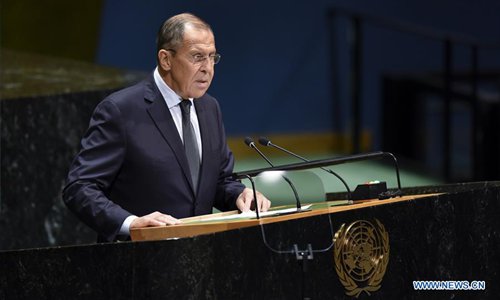HOME >> WORLD
World's problems stem from West's unwillingness to relinquish dominance: Lavrov
Source:Xinhua Published: 2019/9/28 11:37:34

Russian Foreign Minister Sergei Lavrov addresses the General Debate of the 74th session of the UN General Assembly at the UN headquarters in New York, on Sept. 27, 2019. (Xinhua/Han Fang)
Russian Foreign Minister Sergei Lavrov said Friday that the undesirable state of affairs in today's world stems mainly from the West's unwillingness to relinquish its dominance in world affairs.
The number of conflicts has not declined and enmity has not weakened. New most acute challenges emerged. The fragmentation of the international community is only increasing, Lavrov told the UN General Assembly.
"In our view, the reason for the current state of affairs is, first and foremost, the unwillingness of the countries which declared themselves the victors in the Cold War to reckon with the legitimate interests of all other states, to accept the realities of the objective course of history," he told the General Debate, an annual gathering of world leaders.
"It is hard for the West to accept seeing its centuries-long dominance in world affairs diminishing. New centers of economic growth and political influence have emerged and are developing. Without them, it is impossible to find a lasting solution to the global challenges which can be addressed only on the firm basis of the UN Charter through the balance of interests of all states," he said.
Leading Western countries are trying to impede the development of the polycentric world and have been increasingly loath to recall international law and more often dwell on the "rules-based order," said Lavrov.
He said the West aims to revise the norms of international law that no longer suit the West, to substitute them with the "rules" adjusted to its self-serving schemes, which are elaborated depending on political expediency, and to proclaim the West and only the West as an indisputable source of legitimacy.
Instead of collective work based on equal rights, closed formats outside legitimate multilateral framework are created, and approaches agreed upon behind closed doors by a narrow group of the "select few" are then declared "multilateral agreements." This is accompanied by the attempts to "privatize" the secretariats of international organizations, and to use them in order to advance non-consensual ideas in circumvention of universal mechanisms, he said.
Attacks on international law have reached alarming levels, said Lavrov, giving as an example Washington's withdrawal from the Iran nuclear deal in 2018.
Posted in: CROSS-BORDERS,WORLD FOCUS